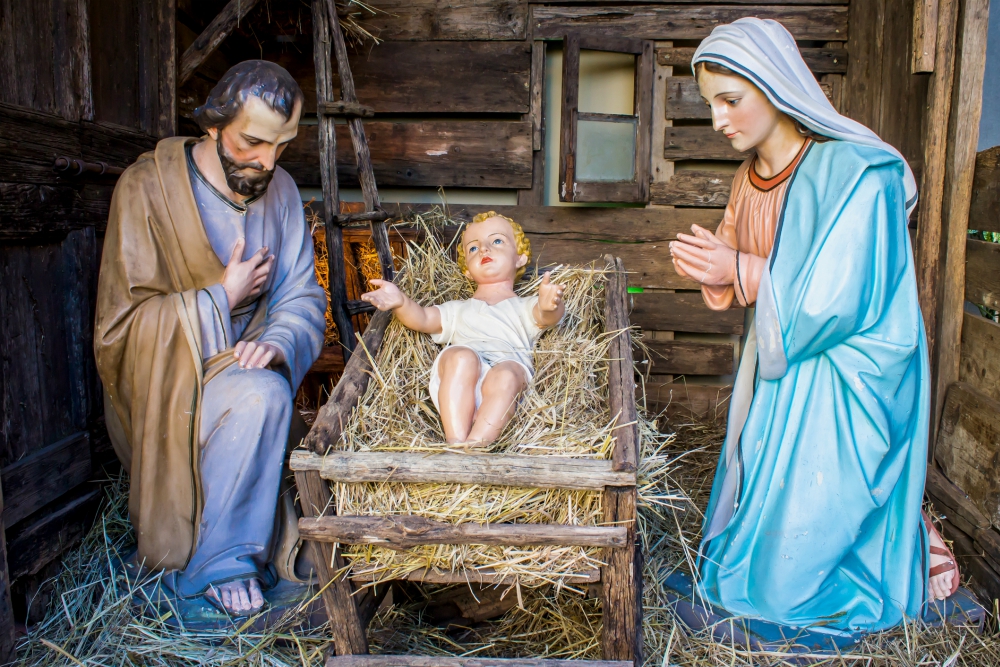
(Dreamstime/Marco Ciannarella)
As a little boy, I lived in a one-bedroom apartment in Chicago with a single mom and was alone a lot. Mom worked at Hirsch Clothing on Lincoln and Belmont, selling dresses and nighties to working-class women. I daydreamed as I looked out the front window on Addison Street toward Wrigley Field and listened to the thunder of seats hammering down whenever Hank Sauer hit a home run. At Christmastime, I spent weeks staging and acting out the stable scene on the floor beneath a tree on a round table between two chairs by the window.
The artificial tree was 2 feet tall. I plugged it in and waited as glass candles made red and green and amber bubbles that floated to their pointed tops. I could watch those bubbles rising and falling for as long as patients stared at the multicolored fish swirling around in the aquarium as they waited their turns at Dr. Sorce's office. I was waiting for Jesus and played out the drama of his coming each day.
I placed a white sheet under the tree atop the table. It fell behind the stable below like snow clinging to the side of a mountain. Under the stable, I draped a tree skirt and rumpled it to make hills. The stable itself was made of cardboard with just enough room for Joseph and Mary and the crib, a cow, two sheep and a shepherd. It reminded me of the little sign my mom hung in the kitchen: "Our house may be small but it's big enough for love, that's all."
The other players in the Christmas story stood on the mountain of a table or made their way to Bethlehem by following the light from the star atop the tree, a piece of plastic that glowed within from a white Christmas bulb stuck inside. The figurines were small and made of plaster and painted in tempera colors. Mary's gown was not a beaded thing from Hirsch but made by her out of linen as white as snow, and the blue cloak over her shoulders was as bright as the morning sky, even at night. Mary prayed on one side of the empty crib while her husband Joseph, dressed in elderly brown, knelt on the other. You could smell the straw in the crib even though it wasn't real. Baby Jesus was still in heaven, behind the tree, waiting for the angels in front to blow their trumpets and sing: Ho, Zana, Ho, Zana, Ho Dasher and Dancer and Prancer and Vixen!
My favorite part was playing with the wise men. They had the longest trek. So I put them in the alcove by the front door. They were poor kings who didn't have camels and one of them wore a chipped crown and they all carried their shiny gifts in both their hands. I moved them through the wind. They plowed through the snow. Sometimes they fell. They always got up. Toy soldiers, Herod's guys, carrying World War II rifles and Tommy guns, were watching everything atop the sofa. They were out to get the wise men. I hid the little kings behind the legs of a chair that was really a tree or under the ragged carpet that was really the good earth until the soldiers turned away. The kings trudged onward. Sometimes the soldiers climbed down the side of the sofa to the floor and got close, but I moved the shepherds to the top of the sofa and they pushed over a boulder of a pillow that knocked out Herod's men.
Advertisement
On Christmas Eve, the wise men reached the stable, weary and sweaty, and thanked the shepherds who surrounded it. I turned off all the lights in the front room. The kings and shepherds and sheep and cow drew close to the crib. Soldiers looked with awe from afar. My hand placed the Christ child among them, like God's hand reaching Adam's and all of us in the Sistine Chapel. I was one with all of them. I had learned to slip myself into the souls of these figurines as gently as their maker poured plaster of Paris into rubber shells. Imagination is the beginning of empathy.
It was during those times that I knew I wanted to be a director or an orchestra leader or a stuntman when I grew up. I played all three parts during Advent. And after all (I would much later learn), what is God but a director of our lives, a loving presence who makes the crooked roads straight, who leads us back to Bethlehem, the place of peace and light from whence we lost our way. I did not want to be God, that was inconceivable, but somehow I would become a priest, which I was told is like a stuntman, a stand-in for Jesus, and later I married as Joseph and Mary did and became a writer and editor, which is nothing if not an orchestra leader of words. It was by being alone as a child that I first learned to lead and protect and wait, not for Godot, but for Jesus. Nothing much has changed.
[Michael Leach is publisher emeritus of Orbis Books and has been shepherding the Soul Seeing column for NCR since he thunk it up in 2011. Some of the best essays are now available in a beautiful book called (aptly enough) Soul Seeing, from Orbis Books.]
Editor's note: We can send you an email every time Soul Seeing is published so you don't miss it. Go to our sign-up page and select Soul Seeing.







